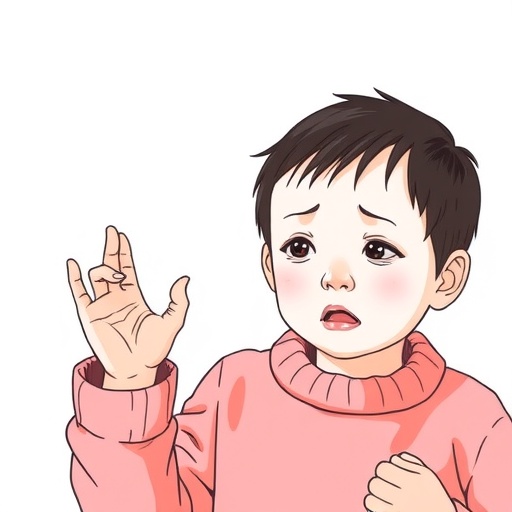In the intricate landscape of pediatric oncology, a hidden psychological crisis is unfolding among the caregivers of young patients diagnosed with retinoblastoma (RB) in China. Recent scientific findings have illuminated the considerable mental health challenges faced by parents, highlighting alarming rates of anxiety, depression, and fear of disease progression (FoP). This emerging evidence pushes the boundaries of pediatric cancer care, bringing to light the urgent need for comprehensive psychosocial support systems that extend beyond the afflicted child and truly encompass the family unit.
Retinoblastoma, a rare yet aggressive intraocular malignancy primarily affecting children under five, imposes not only a burdensome clinical regimen but also substantial emotional strain on families. Researchers embarked on a rigorous cross-sectional investigation comprised of 185 parents of 151 RB patients, employing standardized psychological assessment tools to dissect the multifaceted dimensions of parental mental health. Instruments like the Beck Anxiety Inventory (BAI), Beck Depression Inventory (BDI), and the Fear of Progression Questionnaire-Short Form/Parent version (FoP-Q-SF/PR) enabled a precise quantification of anxiety, depression, and disease-related fears, respectively, while family function was gauged with the Family APGAR Index.
The data painted a stark portrait: more than a third of parents displayed clinically relevant anxiety symptoms, with nearly half grappling with depressive episodes. Most striking, however, was the pervasive extent of FoP, affecting over two-thirds of the cohort to a degree sufficient to disrupt normal functioning. This tripartite psychological burden delineates a layered crisis demanding targeted interventions. Moreover, family dysfunction was evident in more than half the cases, suggesting that the psychosocial reverberations of RB diagnosis transcend individual distress and permeate the family system.
Delving deeper into the etiology of this emotional turmoil, several key factors emerged as significant correlates. Urban residency was associated with heightened anxiety levels, indicating possible environmental or social stressors unique to metropolitan settings. Similarly, an increased number of intravenous chemotherapy (IVC) sessions and tumor recurrence were robust predictors of parental depression. These medical variables underscore the deeply intertwined nature of the child’s clinical trajectory and parental psychological well-being, where extended treatment burdens amplify emotional exhaustion.
An intriguing and somewhat unexpected discovery was the identification of religious beliefs and ethnic minority status as independent risk factors influencing the fear of disease progression. This finding invites a culturally nuanced examination of psychosocial dynamics within the families and suggests that spiritual frameworks and minority group experiences modulate parental perceptions and coping mechanisms in complex ways. The intersectionality of cultural identity and mental health thus emerges as a priority consideration for devising effective support strategies.
These findings bear significant implications for clinical practice. The psychological distress documented in this research calls for an integrative model of care that systematically screens parents for anxiety and depression throughout the child’s treatment journey. Proactive psychological interventions, tailored to the individual risk profiles elucidated by this study, could mitigate the mental health fallout and fortify family resilience. Cognitive-behavioral therapies, psychoeducation, and community-based support programs may serve as key components in this holistic approach.
This research also spotlights the critical impact of tumor recurrence and intensive chemotherapy on parental mental health, illuminating an area where medical advancements should be paralleled by psychosocial safeguards. For clinicians, being vigilant to the cascade of stressors inherent in repeated invasive treatments and disease setbacks can guide empathetic dialogues and timely mental health referrals.
The significant prevalence of family dysfunction revealed calls for family-centered therapeutic interventions, recognizing that a child’s illness is a collective burden shaped by relational dynamics. Enhancing communication patterns, problem-solving capacities, and emotional support within families may alleviate the broader psychosocial strain imposed by RB.
Psychologically, the high incidence of fear of disease progression constitutes a unique challenge requiring specific clinical attention. FoP can perpetuate a cycle of hypervigilance and anxiety that undermines quality of life. Interventions focusing on fear management, uncertainty tolerance, and empowerment strategies could disrupt this reinforcing loop, offering parents greater psychological agency.
The broader societal context frames these individual challenges. Urban residence correlating with increased anxiety points to the need for public health efforts addressing stressors prevalent in densely populated areas, such as social isolation, economic pressures, and healthcare accessibility disparities. Policy makers and healthcare administrators must recognize these environmental contributors in crafting mental health resources.
Moreover, the ethnic and religious diversity factors accentuate the importance of culturally competent care models. Tailoring interventions to respect and incorporate cultural belief systems can enhance engagement and treatment efficacy.
While this study is geographically anchored in China, its revelations reverberate globally, emphasizing universal truths about the hidden psychological landscapes navigated by parents of children facing life-threatening diseases. The universal human experience of caregiving entwined with terror and hope transcends borders, calling for international collaboration in advancing psychosocial oncology.
In conclusion, this groundbreaking study sheds critical light on the psychological toll retinoblastoma exacts on parental caregivers, unveiling a constellation of anxiety, depression, fear, and familial strain that demands urgent clinical attention. To truly elevate standards of pediatric oncology care, medical teams must integrate robust psychosocial screening, culturally sensitive interventions, and family-centered support. Such a comprehensive paradigm promises not only improved mental health outcomes for parents but also creates a more resilient foundation for the child’s therapeutic journey. As pediatric cancer survival improves, the silent epidemic of parental distress must no longer be sidelined but rather embraced as a pivotal axis of holistic healing.
Subject of Research: Anxiety, depression, and fear of disease progression among Chinese parents of children with retinoblastoma
Article Title: Anxiety, depression and fear of disease progression among Chinese parents of children with retinoblastoma
Article References: Yu, Y., Feng, Y., Han, Y. et al. Anxiety, depression and fear of disease progression among Chinese parents of children with retinoblastoma. BMC Psychiatry 25, 850 (2025). https://doi.org/10.1186/s12888-025-07229-w
Image Credits: AI Generated
DOI: https://doi.org/10.1186/s12888-025-07229-w




